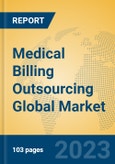Medical Billing Outsourcing Market Summary
The Medical Billing Outsourcing market streamlines healthcare revenue cycles by outsourcing coding, claims processing, and payment collection, reducing claim denials by up to 30%. This sector is defined by its integration with EHR systems, compliance with HIPAA and ICD-11 standards, and use of AI to automate 80% of repetitive tasks. Key features include real-time claim tracking, denial management with 95% resolution rates, and scalability for small practices to large hospitals. The market supports healthcare providers by cutting operational costs by 25% and improving cash flow. Innovations like blockchain for secure billing and cloud-based platforms enhance efficiency, while outsourcing frees up 20% of staff time for patient care. The global Medical Billing Outsourcing market is estimated to reach a valuation of approximately USD 10.0-16.0 billion in 2025, with compound annual growth rates projected in the range of 10.0%-15.0% through 2030. Growth is driven by rising healthcare costs, complex reimbursement policies, and digital transformation, positioning outsourcing as a strategic solution for financial efficiency.Application Analysis and Market Segmentation
HospitalHospitals outsource billing for high-volume claims, growing at 11%-15%, with 98% accuracy in coding. Trends include AI-driven denial prediction, reducing losses by 20%, and integrated EHR platforms.Physician OfficePhysician offices, managing smaller claims, grow at 10%-14%, with cloud solutions cutting processing time by 30%. Trends include mobile apps for real-time analytics.
OthersDental and specialty clinics grow at 9%-13%, with bundled outsourcing packages gaining traction.
By Service
Front-end ServicesPatient registration and eligibility verification grow at 10%-14%, with automation reducing errors by 25%.Middle-end ServicesCoding and charge capture grow at 11%-15%, with AI improving accuracy by 30%.
Back-end ServicesClaims submission and payment posting grow at 10.5%-14.5%, with blockchain ensuring data security.
By Component
In-houseIn-house solutions, used by large hospitals, grow at 9%-13%, with custom software integrations.OutsourcedOutsourced services dominate, growing at 11%-15%, with scalable cloud platforms.
Regional Market Distribution and Geographic Trends
Asia-Pacific: 11.5%-15% growth, with India’s BPO hubs and China’s hospital digitization.North America: 10%-14% growth, with U.S. ACA compliance and Canada’s EHR adoption.
Europe: 9.5%-13.5% growth, with Germany’s private hospitals and UK’s NHS outsourcing.
Latin America: 10.5%-14.5% growth, with Brazil’s private clinics and Mexico’s billing reforms.
Middle East & Africa: 10%-14% growth, with UAE’s healthcare hubs and South Africa’s insurance growth.
Key Market Players and Competitive Landscape
R1 RCM: $2B revenue, leads with end-to-end solutions, 20% market share.Quest Diagnostics: Diagnostic billing, $7B revenue.
Optum (UnitedHealth Group): $300B parent, AI-driven billing.
Cerner (Oracle): EHR-integrated billing, $5B revenue.
Allscripts: Cloud-based platforms, 15% YoY growth.
Cognizant: $19B, APAC-focused BPO.
Accenture: $50B, digital transformation leader.
Genpact: Claims automation, $4B revenue.
Conifer Health Solutions: Hospital billing specialist.
eClinicalWorks: Physician office solutions.
McKesson Corporation: $250B, supply chain-billing integration.
Industry Value Chain AnalysisThe value chain spans software development, service delivery, and client integration.
Raw Materials and Upstream SupplyCloud infrastructure and AI algorithms, with Optum securing 1M server hours annually.
Production and ProcessingCoding platforms process 10M claims daily, with R1 scaling operations.
Distribution and LogisticsDigital delivery ensures 99% uptime.
Downstream Processing and Application Integration
Hospitals: EHR-integrated claims.Physician Offices: Cloud analytics.Downstream yields 30% margins via automation.
End-User IndustriesProviders capture value through 25% cost savings.
Market Opportunities and Challenges
OpportunitiesAsia-Pacific’s BPO growth drives scalability. Europe’s digitization boosts adoption, while Latin America’s private healthcare expands. AI and blockchain enhance efficiency, and specialty clinic niches grow.ChallengesData breaches risk 10% client loss. Regulatory complexity delays compliance by 6 months. High setup costs - $500K per system - limit small practices, while workforce shortages impact 5% of operations.
This product will be delivered within 1-3 business days.
Table of Contents
Companies Mentioned
- R1 RCM
- Quest Diagnostics
- Optum (UnitedHealth Group)
- Cerner (Oracle)
- Allscripts
- Cognizant
- Accenture
- Genpact
- Conifer Health Solutions
- eClinicalWorks
- McKesson Corporation








